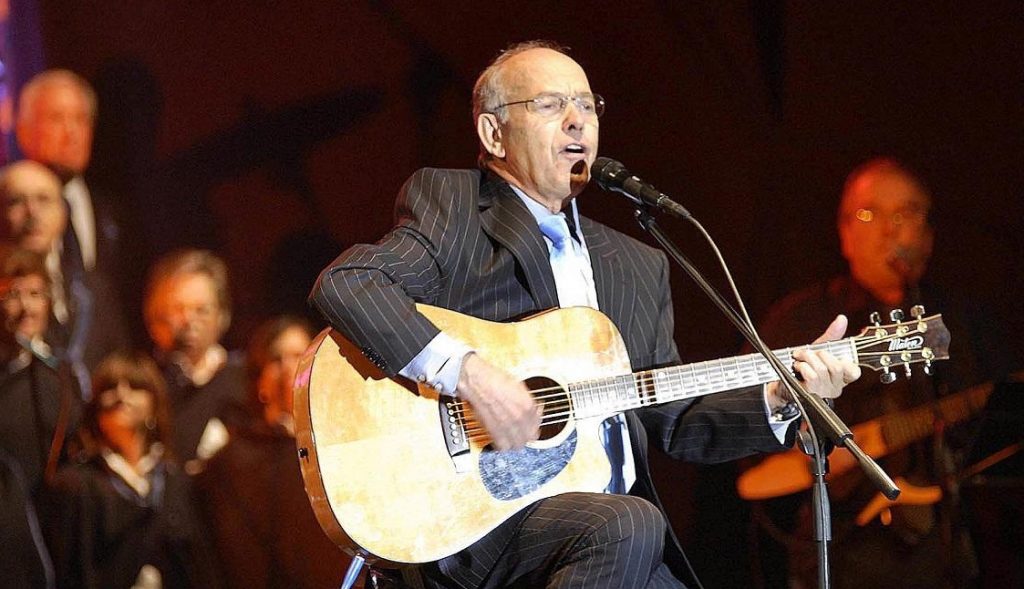Francisco Veredas Bandeiras (Asunción, Elvas, 2 May 1945), pseudonym Paco Bandeira, is a Portuguese singer and composer. With more than forty years of musical career, he is recognized as one of the representatives of Portuguese popular music.
The characteristics of his native region, such as the plains and fields, the interior of the Portuguese province, the border with Extremadura, in Spain, ended up leaving an indelible mark on his music.
He entered military service, spending three years in Angola as a first corporal in a broadcast regiment.
He learned to play the guitar with the help of an uncle and at the age of 14 he became the guitarist and vocalist of the group Cuban Boys, with which he gave several concerts in Portugal and Spain.
For five years he was an announcer on the regional station Radio Extremadura (from Badajoz) of the Spanish Cadena SER. He eventually became known as Paco due to his Spanish ancestry and his initial activity in Spain, where Franciscos are called Pacos, Panchos or Curros. For a long time he lived in Germany and Spain where he was part of the artistic cast of a luxury liner that carried out cruises around the world. He acts on RTP, ZDF (Germany), BBC (England) and French television.
He sang in the troops having been in Angola for three years. In 1966 he recorded an album in Porto for the Rapsódia label, which featured several Brazilian influences.
After his military service, upon returning to Portugal, he began to compose his own songs, and only then began to sing in Portuguese.
He wins the 1st Guarda Song Festival, held between July 21 and 24, 1971, with the song “Sigo Cantando”.
From 1972 onwards, as a soloist, led by Hermínia Silva, he began to sing at that famous artist’s Solar, where Paco had started working when he came to Lisbon. Paco Bandeira performs ” Vamos Cantar De Pé ” at the 1972 RTP Song Festival where he comes in 2nd place. In 1973 he participated in the II Ibero-American Festival (OTI) with “Poema De Mim”.
The first of his hits was “A Minha Cidade” (better known as “Ó Elvas, Ó Elvas”), followed by many other hits, such as “É Por Isso Que Eu Vivo”, “Chula da livração” or “Ceifeira Bonita”. As a result of these successes, he began an intense international career with Portuguese communities abroad, performing on stages and television in Spain, Italy, USA, Australia or Canada.
He was at a Festival held in Bulgaria where he performed the song “That’s why I live”. He won the prize for best poem and interpretation.
In 1980, the album “Malhas, Malhões e Outra Canções” was released, with arrangements by Pedro Osório, whose repertoire was recorded on the program “A Vez e a Voz” on RTP. The album, with themes such as “Tempo de Valsa” or “Flor da Esperança”, was recorded in Madrid at Eurosonic studios. The musician and producer Johnny Galvão participates in the album.
The biggest hits of this phase are “Minha Quinta Sinfonia” and “A Ternura dos Quarenta”.
In 1987, relations between Paco Bandeira and RTP deteriorated, leading to controversy between him and the director of the public television station. At Christmas this year, Paco Bandeira released his twentieth LP, entitled “Com Sequências”, with lyrics by Pedro Bandeira Freire. Meanwhile, he sparked a new controversy, this time between himself and the President of the Portuguese Society of Authors, from whose direction Paco resigned under protest due to the failure of his motion that aimed at adopting “Oh Elvas Oh Elvas” as the National Anthem.
Bandeira was also a member and treasurer of UPAV (Portuguese Union of Variety Artists), roles he performed with remarkable success, having managed to collect fees that had been outstanding for decades. In 1991, he performed at Teatro Rivoli, in Porto, for a show where António Mafra’s ensemble was the special guest. At the same time, Paco was recognized as “a singer who knew how to accompany his audience”.
In his career, he has also participated in television programs in Brazil, Turkey, Bulgaria or Israel, sometimes broadcast on the Eurovision, OTI and Intervisão networks.
In 1992, he presented in Lisbon, at the Teatro Municipal de São Luís, his album “Aqui Para Nós”, in which each ticket gave the right to a CD.
In 1994, his twenty-fifth album was released, entitled “Cantigas Entrelaçadas”, at the same time as he was preparing a program for RTP entitled “Cantares de Amigo”, shown a year later. Still in 1995, he composed the soundtrack for the soap opera “Roseira Brava”, and a series of programs for Rádio Comercial entitled “Cantos da Casa”.
In 1996 he composed the soundtracks for the soap operas “Primeiro Amor” and “Vidas de Sal; in 1997 the soap operas “Filhos do Vento” and “A Grande Aposta”; in 1998 the soap opera “Os Lobos” and in 2000 “Ajuste de Contas” .
In 2006 he released an anthology of some of his greatest hits, in a double album entitled “Paco Bandeira: A life of songs”, which became a huge sales success. In October 2007 he released the album “Canto do Mirror”, with ten original songs, five of which feature choirs from “Coral Harmonia” from Santiago do Cacém.
End of career
On November 17, 2007, the singer performed a concert at the Coliseu de Elvas, which he considered an end to his career, at least as far as records were concerned.
In July 2017, Paco Bandeira shared a video on social media in which he appears to destroy 50,000 of his records, in protest against illegal downloading, the work of promoting music on national radio and Finance. Despite the emphasis given by the media, it was a video made a few years earlier.






I know he is very talented and he builded his career as well
Very complete article